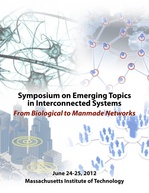Welcome
Technological advancements such as ubiquitous and inexpensive sensing capabilities, high-speed communications enabling the transfer of massive data sets in almost real time, and ever increasing computational power for real-time optimized decisions have contributed to the emergence of large-scale, complex networked systems.
Networked systems are systems that are composed of a large number of smaller subsystems that are dynamically coupled and/or interconnected through a communication medium. Such systems are prevalent in many areas of engineering and sciences, such as communication networks, social networks, transportation networks, biological networks, power networks, and the emerging smart grid.
The science of networked systems is inherently interdisciplinary. In the diverse fields in which networked models arise, network system science must address the associated domain specific modeling issues, as well software and hardware implementations and communications infrastructure. Accordingly, there has been extensive research in many fields dedicated towards deriving guiding principles and theory for the analysis networked systems. Beyond analysis, there also has been significant interest in developing practical methodologies for the design of robust and efficient networked systems.
Of particular interest in networked systems is the phenomenon of systemic risk. While networked systems may perform well under normal operations, they can exhibit fragility in response to certain disruptions resulting in a major system breakdown. In particular, this fragility can arise from seemingly minor and rare disruptions whose collective effect is amplified through a cascade of failures that propagates through the system interconnections. Furthermore, the propagation of failures need not be caused by malicious interventions, but rather stems from the interaction of the interconnected subsystems as they respond to small disruptions. The flash crash of 2010, the recession of 2008, the New England power outage of 2003, or more commonly, the cascaded delays in air travel because of unexpected weather in a hub city like Chicago are just a few of many examples of the systemic risk present in complex interconnected systems.
The growing prevalence of networked systems and the significance of their societal impact have motivated the emergence of a foundational science that allows for measuring, predicting, and containing systemic risk. This symposium is aimed at articulating a picture of the challenges and ideas that will shape the future directions and potential areas of impact of research in the science of networked systems in general and on the emerging field of systemic risk. This meeting will bring together leading researchers who have been influential in shaping the vision of and leading this field. They will present a combination of theoretical analysis and applied experimental research.

 Massachusetts Institute of Technology
Massachusetts Institute of Technology